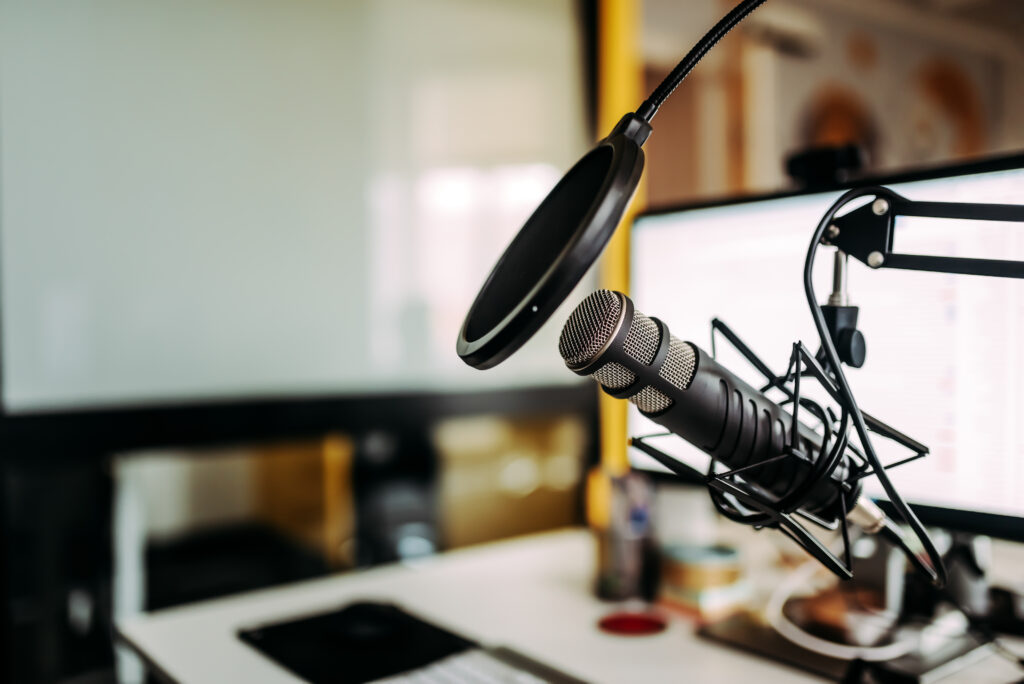Podcasting can offer you a great and fun experience. Whether you’re just getting started or you’re working to improve your podcasting, there are always new techniques you can try. To produce quality podcasting content, you’ll need various kinds of equipment.
You can really get started with any equipment you like as there are no particular requirements. However, below are some types of equipment you may need for your podcast:

- Microphones
You can use the built-in microphone of your phone or computer, but the audio quality will be pretty low—so, it’s best to invest in a good quality microphone. If you seriously want to start your podcast, you’ll want a quality microphone from a reputable vendor like grooveboxstudios.com. If you have multiple hosts on your show, you’ll benefit from having one for each voice on your show.
- Pop Guard
Pop guards are a filter that stops the audio from popping when people say words that start with strong consonants like B and P—such sounds can be grating for your audience and repairing them in your edit can be a tough job. So, try avoid them whenever you’re recording your podcast. Pop guards come as a cover for the mic itself or a screen between the speaker and the mic, depending on your preference and your style of microphone.
- Computer
Everyone who podcasts has a computer. The good thing about recording audio is that, regardless of whether your computer is old or new, you can definitely make it work for recording and editing your podcasts. However, when you look for any podcasting software, always pay attention to the requirements and see to it that your computer is compatible.
- Headphones
The next thing you might want to get as soon as you start your own podcast is some quality headphones. Headphones are also one of the crucial pieces of equipment in any podcast kit. There are a lot of sounds that may affect your recording or may render your audio unusable. More often than not, you might not be able to pick up such sounds with your ears, so it’s important to wear headphones as you record. When you wear headphones to monitor what you’re recording, you’ll be able to hear just what the microphone is picking up, and you can adjust your audio levels accordingly.
When shopping around for headphones, you don’t have to purchase the most expensive ones. In fact, you may start out using your current earbuds and just upgrade it in the long run if you have the budget for good quality headphones.
- Microphone Stand
A microphone stand is a good solution for getting the microphone up off your desk and closer to your mouth. This is an important consideration since the vertical alignment below or above the mouth may impact your voice’s sound.
Using a microphone stand may also lessen the chances of knocking into the microphone or having it rub against something while you’re recording.
- Mixer
When making a podcast, you’re going to want a way to put your podcast together. For that reason, having a mixer is worth splurging on. Regardless of whether you’re adding background music, laying tracks, or experimenting with sound effects, a mixer is a great solution.
A good quality mixer has analog inputs with microphone preamps, which can be ideal for podcasts that have to record different sources simultaneously. There are also mixers with several headphone outputs, which let two people monitor the mixing and recording at once without compromising the sound quality.
- Digital Recorder
If you often do interviews while on the go, having a portable digital recorder is the perfect equipment to have. You may always get started using your phone’s microphone, but a handheld recorder provides you more flexibility. Depending on your preferences, choose a digital recorder that comes with great features and available at an affordable price.
- Shock Mount
Microphones can be very sensitives and pick up all sorts of minute sounds that you don’t want it to register. Shock mounts can minimize or prevent unwanted sounds from typing to tapping your desk or moving your boom arm that you might not notice. Many microphone makers also provide a compatible shock mount and offer one with the microphone.
Conclusion
Buying podcast equipment for the perfect setup is probably the first huge hurdle that aspiring podcasters may face. Other people may opt to splurge on a microphone, while some would prefer premium audio editing software for better post-production. However, the choice is always yours. Depending on your needs or preferences, you have the freedom to pick any kind of equipment suited for your podcasting goals.
